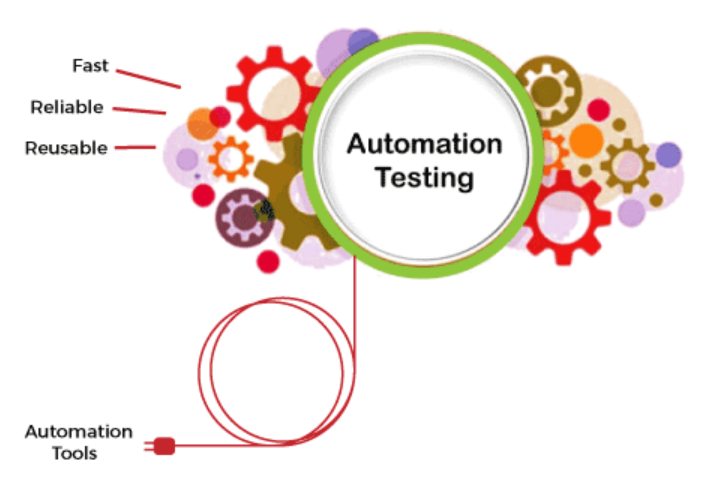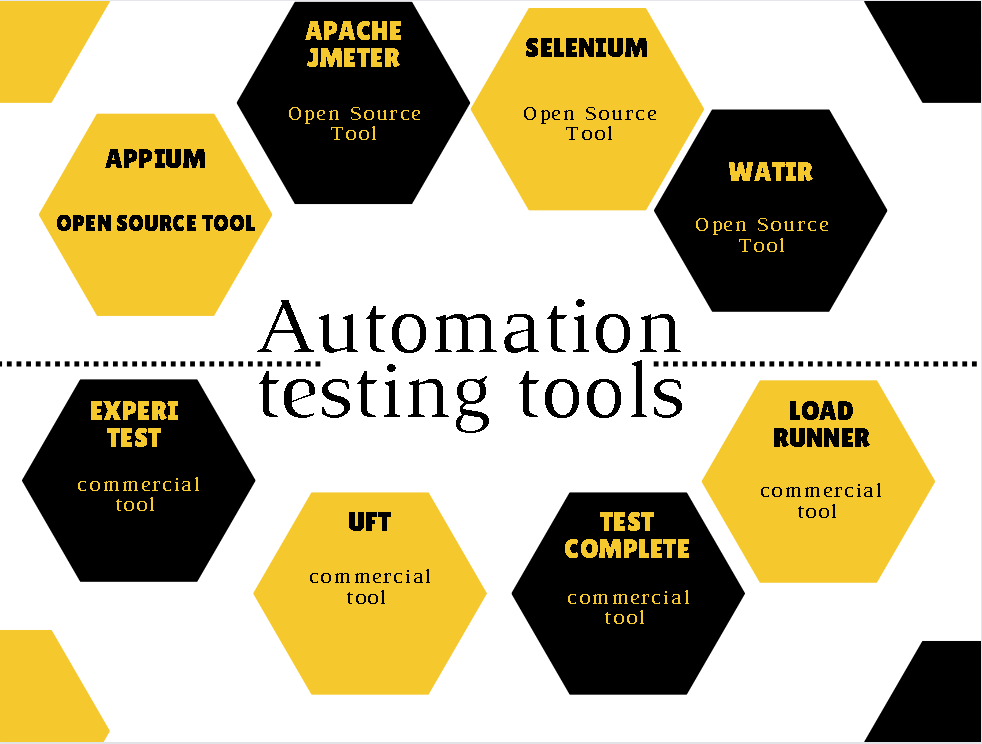In the world of the IT industry, automated testing has grasped its place very well. It’s a promising career option or specialization to go with. One of the options to get high-paying jobs is to enter into automation testing. Let’s understand in detail what is automation testing, automation testing types, different automation tools and its scope.
Certainly, there are two types of testing: manual and Automated in the world of IT or software. No doubt the purpose of both tests is the same: to compare the test result with the expected one. We can define automated testing as the use of software to control the execution of tests and compare the actual results with the expected results. In another way, we can explain what is automation testing it’s a way to reduce the number of manual tests that must be executed by a human tester and increase speed and efficiency. It can be used to test the functionality of an application or system, as well as its performance, reliability, and security.

Benefits of Automated Testing

After understanding what is automation testing let’s understand its benefits. There are various benefits that are
- Test execution gets simple
- The intervention of humans gets less
- It speeds up the test
There are multiple automation types and automation tools that a developer uses to get these benefits. Let’s understand both types and tools in detail one by one.
Different Automation Testing Types

Now we know what is automation testing. After that, it’s important to understand different automation testing types. There are multiple categories under this.
1. Unit testing: Here in the category testing of individual units or components of code happens. It ensures that they are functioning correctly. Unit testing can be automated easily and whenever there is a new code this test can run automatically.
2. Integration testing: Integration testing means testing the integration of different components or modules of an application to ensure that they are working together as intended. This can be tested automatically.
3. System testing : is another automation testing type that involves testing the entire system or application. However, its purpose is to ensure that it meets the specified requirements and works as expected. Moreover, there are two kinds of system testing
- Functional testing
- Smoke tests
4. Regression testing:
This involves re-running previous tests to ensure that changes or updates to the code have not introduced new defects.
5. Acceptance testing
This involves testing the system or application from the end user’s perspective. Its agenda is to ensure that it meets their needs and is fit for purpose.
6. Performance testing:
This involves testing the system or application to ensure that it can handle the required load and perform at an acceptable level. Moreover, this includes testing for scalability, reliability, and response times.
7. Security testing:
This testing which is known as security testing involves testing the system or application to identify vulnerabilities and ensure that it is secure.
8. Mobile testing:
It is an automation testing type that involves testing mobile applications on different devices and platforms to ensure that they function correctly.
Till now we have discussed what automation testing is, the benefits of automation, and different automation testing types. After understanding all this it’s important to know about different automation testing tools which have been used by developers to run these automated tests.
Different Automation testing tools
Another important aspect of learning after getting clarity on what is automation testing is learning different automation testing tools. Developers use many different types of Automation testing tools.

1. Selenium: Selenium is a type of automation testing tool. It’s an open-source tool that is used to automate web browsers. It performs functional, regression, and acceptance testing on web applications.
2. Watir: Next automation testing tool is Watir. It is an open-source tool that is used to automate web browsers and perform functional testing on web applications.
3. HPE Unified Functional Testing (UFT): UFT automation testing tool is a commercial tool that can be used to automate functional, regression, and acceptance testing. This happens on a variety of applications, including web, mobile, and desktop.
4. Test Complete: The test complete automation testing tool is also a commercial tool that can be used to automate functional, regression, and acceptance testing on a variety of applications, including web, mobile, and desktop.
5. Apache JMeter: Another automation testing tool is Apache JMeter. It’s an open-source tool that can be used to perform load and performance testing on web applications.
6. LoadRunner: Next name is LoadRunner in the automation testing tool. It is also a commercial tool that can be used to perform load and performance testing on a variety of applications, including web, mobile, and desktop.
7. Appium: An open-source tool that can be used to automate functional testing on mobile applications.
8. Experi test: A commercial tool that can be used to automate functional, regression, and acceptance testing on mobile applications.
Automation testing Scope

In the world of software understanding what is automated testing is very fruitful work. But questions come why one should know what is automation testing along with its details. The answer is very simple because the scope of automated testing is very huge in the upcoming time.
Here are a few points on why Automated testing is gaining demand in the market.
1. Companies adopting agile methodologies– It is becoming increasingly popular as more and more companies are adopting agile development methodologies and looking for ways to improve the efficiency and reliability of their testing processes. The future of automated testing looks promising, as advancements in technology continue to make it easier to automate a wide variety of tests.
2. Increased use of artificial intelligence (AI) and machine learning (ML)- One trend that is likely to continue is the increased use of artificial intelligence (AI) and machine learning (ML) in automated testing. This could include the use of AI and ML to create more intelligent test automation frameworks that can adapt to changes in the application under test, as well as to create test cases that are more robust and able to find more defects. Additionally, AI-driven test generation will be more likely to improve test coverage, by finding new inputs and test scenarios.
3. Cloud-based testing– Another trend is the continued shift towards cloud-based testing. Cloud-based testing platforms allow teams to easily run tests in parallel across multiple environments, reducing the time and costs associated with testing. This has become even more relevant with the increase in remote work, allowing teams to work remotely while still maintaining access to testing resources.
4. DevOps and Continuous Integration/Continuous Development (CI/CD)– Additionally, the adoption of DevOps and Continuous Integration/Continuous Development (CI/CD) practices is also expected to increase in the future, which will drive the need for automated testing solutions that can integrate seamlessly with these tools. This will allow for faster development and delivery cycles and a more efficient testing process.
Till the time the IT world or developers are using software, automated testing is going to be there. And it’s a field which is having very good growth chart.
Undoubtedly automation testing tools will be doing the work but nothing can replace the professionals with proper knowledge and logical reasoning. Hence, we can say with full confidence that this field is one of the growing career paths one should enter into.
Many Institutes are offering courses on
- Automation testing
- Machine learning
- Artificial intelligence etc.
One of the leading ed companies, Henry Harvin is also offering Certification in Automation Testing Course. After completing a certification course on automated testing one can get his/her concepts on what is automation testing, what automation tools along with different types. Furthermore, the candidate becomes eligible for lucrative, high-paying jobs.
Eligibility for Certification courses in Automated testing.
- Testers
- System analysts
- QA engineers
- software developers
- Freshers or graduates can also pursue these courses
- Administrators Professionals
Conclusion
Automated Testing is one of the upcoming areas in the IT world, which can be taken as a growing career path. Because of the high demand for automation in the world, knowing what is automation testing can be an asset. Getting professional knowledge in this field and knowing everything about automated testing in detail can help you in grooming your career life.
Recommended Reads
Frequently Asked Questions
Ans- Yes, even a fresher can do certification courses in the automaton industry or they can start with manual testing and eventually learn automation testing.
Ans- Yes, It is all about statement coverage, and code coverage. So a tester should have proper knowledge of coding, and programming to work in this field.
Ans- Henry Harvin certification course is of 6 months. Rest varies from institute to institute.
Ans- Candidate with bachelor’s degree. For students with a 10+2 certificate, there is an undergraduate automation test engineer course.











I appreciate the detail provided in this article. It answered all my questions about automation testing. Very informative and well-written. I would recommend this to anyone looking to learn about automation testing.
This article is a comprehensive guide to automation testing! I am impressed by the depth of knowledge and understanding that has been given in this article. The definition provided for automation testing is very informative, and I believe it will help a lot of people who are new to this field. The explanation of the different types of automation testing was also very helpful, as it allowed me to understand the different approaches that can be taken in automation testing. The discussion of the various tools and their features was also very informative and gave me a good idea of what to look for when choosing an automation testing tool. Overall, this article has been a great resource for me and I would highly recommend it to anyone looking to learn about automation testing.